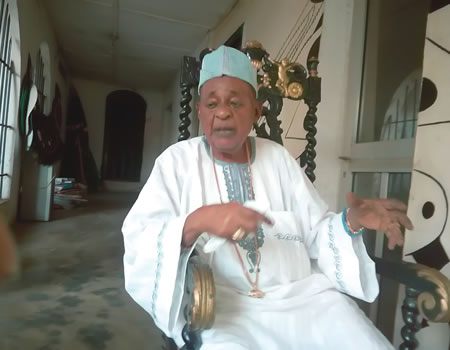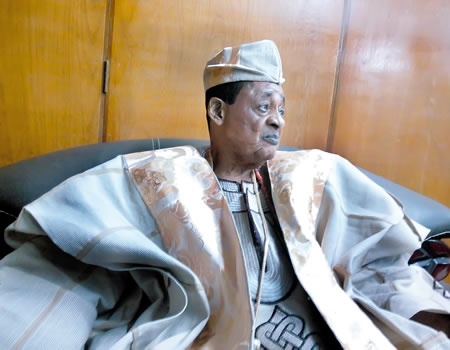
The Alaafin of Oyo, Oba Lamidi Adeyemi, is a prominent Yoruba traditional ruler. TUNDE BUSARI presents excerpts of an interview with him after Oba Adeyemi touched on key aspects of the Yoruba nation at a lecture presented at the Obafemi Awolowo University, Ile-Ife, where he was joined by the Ooni of Ife, Oba Eniitan Ogunwusi, and others at the event.
The Obafemi Awolowo University was founded by the late sage after whom it was named. How connected is the university to the Yoruba nation aside from the fact that it is situated in Ile-Ife?
I have over the years faithfully and keenly followed intellectual and academic developments at OAU. I am therefore, quite aware of how this university, more than its peers, have achieved global recognition, commendation and acceptance, not just as an institution of learning, but also a citadel or foundation of knowledge. I am always impressed by the university’s declaration and commitment to learning and culture which is the timeless motto of the institution. The university, also called ‘Great Ife’, has lived up to expectation in terms of the quality of instructions, the functionality of the education produced here and the heroic contributions of her alumni to humanity generally. With what we have seen about Ife, I agree entirely with John F. Kennedy, the ‘New Deal Era’ American president, when he said, “The goal of education is the advancement of knowledge and the dissemination of truth.”
You are often credited to be the embodiment of Yoruba culture both in word and action. Are you not worried that the Yoruba Language may go the way of Latin given the current state of the language and its use?
I don’t agree with that assertion. I am, therefore, not worried. I am not worried because those who corrupt the language and those who don’t speak the language cannot be compared, in terms of number, with those who speak it as a matter of obligation. In other words, only those who passed through schools are found in that category whereas majority of our people are rural dwellers who still speak Yoruba as it used to be because it is the only language they can speak.
Also, I don’t agree with you because of the realisation that even our educated elite, our professors now see the reason they must promote their language. Our sons and daughters living abroad too are serious in teaching their children their language. This shows that the Yoruba Language is considered important to the development of their children born in non-Yoruba communities.
A research conducted by the late Professor Fafunwa here at the Obafemi Awolwowo University, showed that pupils understand subjects better if taught in Yoruba Language. If you are very proficient in your mother tongue, it will help you understand and interpret other languages easily. But our story today is that of a generation who cannot speak good Yoruba and good English at the same time. As I have said earlier, there is hope in reversing the trend with our Houses of Assembly now conducting proceedings and members contributing in Yoruba Language. I think the Lagos State House of Assembly started this first. Japan is a leading country in manufacturing of vehicles. They use their language. Same goes for the Chinese. Yoruba Language will be a panacea to social technology. If you know Yoruba very well, application to Mathematics, Algebra, Physics and other science subjects in particular will be easy. I have no doubt in my mind that Yoruba language will not go into extinction. By the grace of God, it won’t happen because the language is too rich to disappear.
Yoruba Language is just an element of Yoruba cultural composition. Don’t you think our culture is being eroded by western influence in particular?
No! I don’t agree with you. An average Yoruba person attaches great importance to greetings and respect to elders and lawfully constituted authority. This is also seen in dressing, food, cleanliness of the environment and other elements of our culture. Let me give you an example. Your parents determine how you are born and there are genes you inherit from them. That is one of the parameters of your heritage. Also the environment where you are nurtured determines your personality.
Can you assess the place of the Yoruba people in the contemporary history of Nigeria?
The Yoruba people are not a minor ethnic group. They go even beyond Nigeria. That is the truth which is even known to many other ethnic groups. In my prepared remark for the Aare Afe Babalola lecture, I brought out those elements that make Yoruba a pacesetter. In the paper, I stated that “While some groups had limited understanding, narrow conceptualisation and vision of authority, the Yoruba were building prosperous and viable states and even empire. It is trite knowledge that the edifice known as the Old Oyo Empire represents the glory and acme of Yoruba political architecture and political philosophy. Oyo survived many vicissitudes and challenges but eventually emerged as the most enduring political system and is reputed to have flourished for more than 6,000 years arguably better than the Western Sudanese kingdoms of Tekrur, Ghana, Mali and Songhai. Oyo which was a leading African State at all times was built on the political thoughts of Oranyan, the legendary empire builder with an incontrovertible reputation of being responsible for the emergence of central authority among the Edo in Benin kingdom, Ife and other such places on the Western axis of Yoruba land. While some states were satisfied with limited government and autonomous communities and some others could not unite under a single political umbrella before the 19th century, the Yoruba had succeeded in designing a model of administration which allowed Oyo Yoruba cultural hegemony to provide the sinews of political ascendancy over a considerably extensive area of land.” In essence, the success of the Oyo political thought in building enduring states was predicated on the ability of the Yoruba culture to be hegemonic and at the same time benevolent.
I learnt you delivered a speech at the commissioning of the Oyo State Technical University, earning you an ovation. What inspires your extemporal presentations at public functions?
I think I should start by drawing a distinction between studying and reading. It is very important we understand the two, which unfortunately are often used interchangeably even by those who are expected to know. When you study, you study notes given you and textbooks recommended by your teacher. Test and examination are therefore based on what you are taught in class and read in the textbooks. You are tested and examined to know your assimilation level. This is what is common in our society today among our graduates, which sadly is not helping scholarship and knowledge acquisition. That is why few years after graduation, they can’t recollect what they studied in order to pass.
Reading, on the other hand, is when you pick any book outside your course and read. This exercise is everlasting because it is part and parcel of your personality and life. If you don’t read, you are not okay. I think I once told you how I was almost stranded in a British bookshop after I had spent all I had on buying books.
How did you get out of it?
I got out of it but I won’t tell you how. In fact, the person with whom I was almost stranded, an important Yoruba son and my friend, did not know how I did it. I did not tell him. In a nutshell, reading makes you an authority and inspires you to write intellectual pieces and make robust contribution to discourse either in private or public. It is part of me to always prepare myself well by reading any book available. The late Chief Obafemi Awolowo is still relevant today because of his depth which did not come from the four walls of a classroom but self-development. He read Economics and Law. Do you know the number of books he wrote? If I ask you now, you need to search on Google. Former Prime Minister of Britain, Wilson Churchill never attended any school yet he was known for his power of oratory that earned him international respect, especially during the Second World War between 1939 and 1945. Dr Nnamdi Azikiwe wrote and spoke the English language and the white man marveled. When I was young, I wrote a poem titled ‘I shall be great’. It was adjudged a masterpiece. I later wrote another titled ‘I shall be the next Alaafin’, which was published in the Daily Times. Our young ones should cultivate the habit of reading instead of memorising to pass examinations.
Aare Afe Babalola is said to be your friend. Can you shed more light on your relationship?
Aare Afe Babalola is not just my solicitor; he is my bosom friend of more than 40 years. He has over the years been in the legal trenches together with me from one litigation to another and recorded success in all of them. Are Babalola is a high chieftaincy title holder of Oyo. He bears the title so well and has taken it to greater heights in terms of popularity and recognition. It was actually bestowed on him in recognition of his gargantuan stature as a lawyer and his solid credentials as a Yoruba and Omoluabi. He is one of the best lawyers that have given the Yoruba people that leverage over other ethnic groups in the entire world. He is a first class legal luminary whose life is all about law. When you engage him in intellectual discussions, you would see how deep he is. He knows all that needs to be known in law. His confidence is boosted by his competence.
Can you recall one of the major cases he handled for you?
When I wanted to install the late Aare Ona Kakanfo, Moshood Kasimawo Olawale Abiola in 1988, before then I had announced that whoever felt he deserved it more than Abiola, a philanthropist of note, should come forward. Nobody came forward but the government of the day, the military with their power was not comfortable. The matter became a subject of litigation. Are Afe Babalola swung into action. It was at six in the evening of the day preceding the installation that the court ruled in favour of the installation. It is difficult for anyone to ignore Are Babalola’s academic distinction and contribution to the phenomenal expansion of access to higher education through the establishment of and proprietorship of the fastest growing private university in sub-Saharan Africa, the Afe Babalola University, Ado-Ekiti. He is a public intellectual par excellence and I cannot claim to know his subject more than he does. Are Afe Babalola is a diligent and brilliant scholar of law, a hardworking jurist, a living encyclopedia of rules of court and master of the techniques of legal rigmarole. He is indeed a first class practitioner of his jurisprudential and philosophical thought on law and education respectively.




